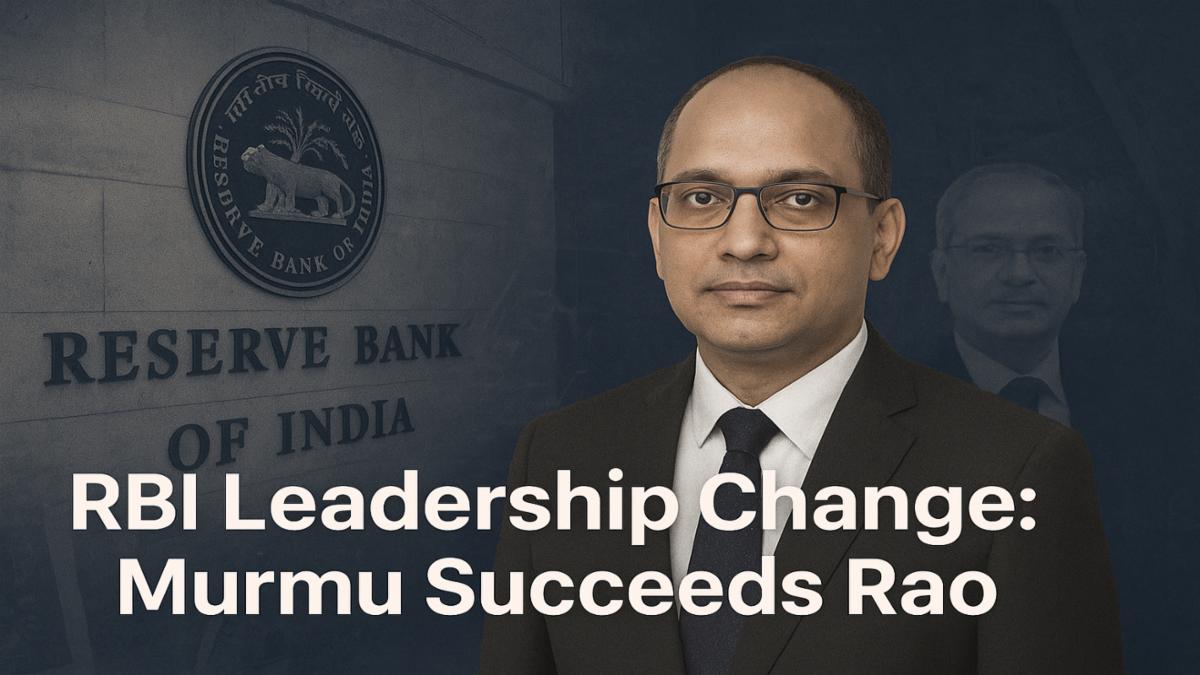Article Body
Shirish Chandra Murmu Appointed as RBI Deputy Governor, to Succeed Rajeshwar Rao
Mumbai, September 29, 2025 -- In a significant leadership shift at India’s central bank, the government has appointed Shirish Chandra Murmu as the new Deputy Governor of the Reserve Bank of India (RBI). He will officially take charge on October 9, 2025, for a three-year term, replacing M. Rajeshwar Rao, whose tenure concludes a day earlier.
The announcement, formalized in a government notification, comes at a time when the RBI is grappling with challenges ranging from persistent inflationary pressures to global economic volatility.
Why This Appointment Matters
The RBI operates under the stewardship of the Governor and four Deputy Governors, each responsible for critical portfolios such as monetary policy, banking supervision, financial market regulation, and operational oversight. Together, they form the core leadership of the institution that guides India’s economic stability.
Murmu’s appointment is being viewed as both a continuity move and a signal of trust in an insider who has decades of experience navigating the complexities of banking regulation. His track record in supervision and policy implementation suggests that his entry into the deputy governor’s office is designed to ensure smooth succession during a sensitive period.
Who Is Shirish Chandra Murmu?
A veteran career central banker, Murmu joined the RBI in the early 1990s and steadily rose through the ranks. Over the years, he has handled diverse portfolios, including banking regulation, supervision of non-banking financial companies (NBFCs), currency management, and risk monitoring.
Most recently, as an Executive Director, he oversaw departments central to the bank’s internal governance and regulatory framework. Insiders describe him as a “quiet operator” — someone who avoids the limelight but plays a critical role in shaping regulatory responses.
The Legacy of Rajeshwar Rao
Murmu steps into the shoes of Rajeshwar Rao, who has served as Deputy Governor since October 2020. Rao’s tenure coincided with some of the most turbulent years in modern financial history, including the aftermath of the COVID-19 pandemic, tightening of global interest rates, and India’s rapid fintech expansion.
During his time, Rao was instrumental in:
-
Strengthening supervision over shadow banking entities.
-
Steering reforms in digital payments and consumer protection.
-
Reinforcing risk management practices for banks facing rising loan defaults.
Analysts say Rao leaves behind a “robust regulatory footprint,” though challenges such as cyber threats in digital finance and rising household credit remain unresolved.
What Portfolios Could Murmu Oversee?
While the RBI has not formally disclosed which departments Murmu will lead, it is widely expected that he will inherit many of Rao’s responsibilities. These may include:
-
Banking Regulation and Supervision – Ensuring compliance with prudential norms and strengthening oversight of private and state-owned banks.
-
Enforcement – Handling penalties, compliance lapses, and corrective action plans for institutions.
-
Legal and Risk Departments – Overseeing litigation and risk mitigation frameworks within India’s financial system.
His potential role in these areas could shape how India deals with looming banking risks, particularly as small cooperative banks and NBFCs face pressure from rising interest rates and tighter liquidity.
The Broader Economic Context
Murmu’s appointment arrives at a time when India’s economy is in a delicate balancing act:
-
Inflationary Pressure: Food and energy prices remain volatile, forcing the RBI to walk a tightrope between growth and price stability.
-
Global Headwinds: The prospect of higher U.S. interest rates and geopolitical tensions are testing India’s external sector.
-
Digital Disruption: With fintech platforms reshaping consumer credit and payments, regulatory gaps remain a top concern.
Against this backdrop, a seasoned regulator like Murmu is expected to be a stabilizing force.
Political and Industry Reactions
The appointment has already drawn reactions from across the spectrum. Senior political leaders praised the decision as a “well-deserved elevation,” while banking industry veterans noted that Murmu’s long institutional memory makes him uniquely suited to the role.
“The RBI is not just a policy-making body; it’s a guardian of trust,” said an industry analyst. “Murmu’s ability to maintain continuity while steering regulatory innovation will be crucial.”
Challenges Ahead
Murmu’s tenure will not be without hurdles. Among the pressing issues he will face:
-
Strengthening Smaller Banks – Cooperative banks and rural credit institutions remain vulnerable.
-
Fintech Regulation – Striking the right balance between innovation and consumer protection.
-
Cross-Border Risks – Managing currency volatility and capital flow shocks from global markets.
-
Climate Finance Oversight – Integrating sustainability into banking frameworks, a growing priority for regulators worldwide.
Looking Forward
As Shirish Chandra Murmu prepares to step into his new role, the transition represents more than just a change of office. It marks a continuation of RBI’s steady hand in a turbulent financial era, with the expectation that he will not only uphold Rao’s legacy but also chart a path for the future.
For India’s financial system and for millions of citizens whose daily lives are shaped by the central bank’s decisions the coming three years will be closely watched. Whether it is taming inflation, tightening fintech oversight, or safeguarding banking health, Murmu’s leadership will play a decisive role in shaping the RBI’s credibility and India’s economic trajectory.


Comments